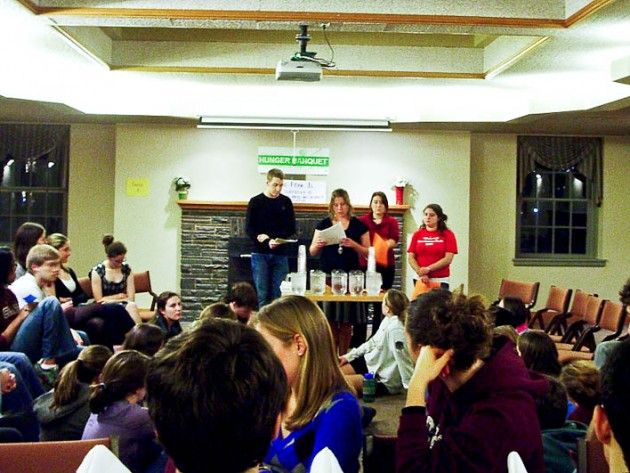Banquet Fights Hunger, Homelessness
On Monday, November 2, Oxfam, an international organization working to ameliorate poverty and injustice in the world, and the Colgate Hunger Outreach Program (CHOP), a local organization with the same goal, sponsored their Second Annual Hunger Banquet. With the aim of increasing society’s awareness of economic disparities both in Madison Country and in the world at large, participants – surrounded by signs with messages like “being poor is thinking $8/hour is a really good deal” – were given a ticket with a person’s life story on it randomly assigning them to a high-, middle-, or low-income class and experienced for themselves how it felt to be seated and receive food according to that economic class.
Participants assigned to the high-income class were well off: they sat in chairs around a table, ate from chinaware and were served pasta and salad. Those assigned to the middle tier, however, sat in chairs without a table, ate from paper plates, and received squash and mashed potatoes. Finally, the ones in the low-income group divided a modest portion of mashed potatoes amongst themselves on the floor. The amount of food distributed, the way in which individuals were seated and the number of individuals in each group – 15 percent in the high-income tier, 35 percent in the middle income tier and 50 percent in the low-income tier – all served to visually illustrate the social and economic inequalities in our world today.
“The structure of the event allows students to experience first-hand the huge disparity in resources that exists in the world. We’re trying to ‘pop’ the Colgate bubble and show students how the majority of the world lives – a reality where $10,000 a year places you in a high income class,” CHOP organizer junior Brenda Boyle said. “What many of us don’t realize is how close such issues of hunger are to us. Upstate New York and Madison County are some of the poorest regions in the United States. On campus, students have Curtiss E. Frank Dining Hall (Frank) and its endless supply of food that we can access with a simple swipe of a Gate card. Five minutes away from campus, local residents and families need assistance in obtaining basic food items and toiletries. By provoking genuine reactions and discussion, we are being proactive in addressing poverty issues by offering ways to take action on campus: involvement in Oxfam and CHOP or volunteering at the Food Cupboard, the Friendship Inn or Utica Hope House. We’re bringing awareness to a very real problem and addressing how we can take action to address that problem right here, right now.”
There was a wide range of reactions among the banquet’s participants. Some, assigned to the middle or high tier, did not want to accept their comparatively large quantity of food when they saw how many individuals in the lower tier were fed very little. Consequently, they offered some of their food to the lower classes. Others, assigned to the lower tier, portrayed a sense of pride for their frugality and started commenting on the tendency of students to waste food at Frank Dining Hall. All in all, many felt that the experience as a whole allowed them to connect to the problem of hunger and homelessness in a way they had not before.
“It is really interesting to see the variety of responses people have throughout the dinner, how much they learn from it, and how they come to realize they can make a difference,” Oxfam organizer junior Lindsay Miller said.
At the conclusion of the meal, all participants were divided into groups and discussed what they learned from experience. The majority of participants were simply shocked to realize how privileged they are in comparison with the rest of the world. Several also commented on how the low-income and high-income classes live distinctly separate lives.
Despite the harsh reality of the dinner, however, Miller ended the evening on an optimistic note.
“The Hunger Banquet this year was a huge success. We increased awareness about hunger and poverty issues around the world and raised money for the local Hamilton food cupboard,” Miller said. “We’re sort of like this ‘city on a hill’ here at Colgate, and it just takes walking five minutes down the road to see that poverty and hunger is a huge problem right here in central New York. All of us have so much, and it really takes so little for us to notice. And when we notice, we are all the more likely to act. And that action can be as little as just finishing all the food on your plate or it can be as much as volunteering every week at a food cupboard or in a developing country. We all have the power to choose what we want to do, but its difficult to know what to do if we don’t know what the problem is.”







